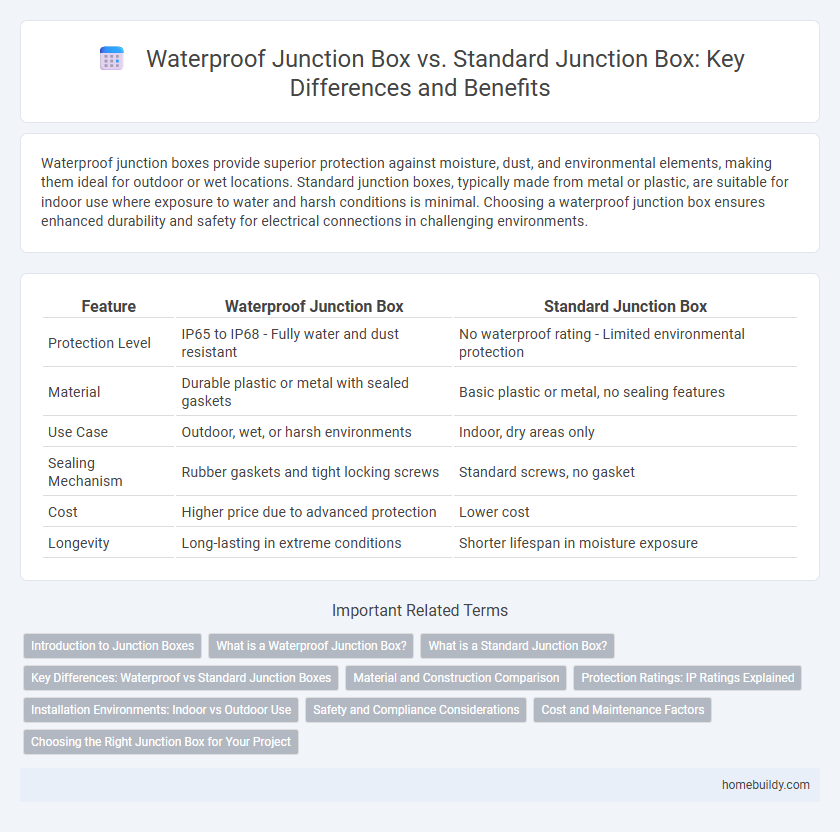Waterproof junction boxes provide superior protection against moisture, dust, and environmental elements, making them ideal for outdoor or wet locations. Standard junction boxes, typically made from metal or plastic, are suitable for indoor use where exposure to water and harsh conditions is minimal. Choosing a waterproof junction box ensures enhanced durability and safety for electrical connections in challenging environments.
Table of Comparison
| Feature | Waterproof Junction Box | Standard Junction Box |
|---|---|---|
| Protection Level | IP65 to IP68 - Fully water and dust resistant | No waterproof rating - Limited environmental protection |
| Material | Durable plastic or metal with sealed gaskets | Basic plastic or metal, no sealing features |
| Use Case | Outdoor, wet, or harsh environments | Indoor, dry areas only |
| Sealing Mechanism | Rubber gaskets and tight locking screws | Standard screws, no gasket |
| Cost | Higher price due to advanced protection | Lower cost |
| Longevity | Long-lasting in extreme conditions | Shorter lifespan in moisture exposure |
Introduction to Junction Boxes
Junction boxes serve as protective enclosures for electrical connections, ensuring safety and organization in wiring systems. Waterproof junction boxes provide enhanced protection against moisture, dust, and environmental elements, making them ideal for outdoor or wet locations. Standard junction boxes, typically made of metal or plastic, are designed for indoor use where exposure to water or harsh conditions is minimal.
What is a Waterproof Junction Box?
A waterproof junction box is specifically designed to protect electrical connections from moisture, dust, and other environmental elements, ensuring safe and reliable performance in outdoor or wet conditions. Constructed with weather-resistant materials and equipped with sealed gaskets, waterproof junction boxes maintain a secure, watertight enclosure that prevents water ingress. This contrasts with standard junction boxes, which lack these protective features and are intended for dry, indoor applications where exposure to moisture is minimal.
What is a Standard Junction Box?
A standard junction box is a non-waterproof enclosure designed to house electrical connections in dry, indoor environments, providing protection against dust and accidental contact. Unlike waterproof junction boxes, which have sealing gaskets and are rated for moisture resistance (such as IP65 or higher), standard boxes typically lack these features and are not suitable for wet or outdoor applications. Common materials for standard junction boxes include plastic and metal, with sizes varying to accommodate different wiring needs.
Key Differences: Waterproof vs Standard Junction Boxes
Waterproof junction boxes feature sealed gaskets and durable materials that prevent water ingress, making them ideal for outdoor or damp environments. Standard junction boxes lack these protective elements, offering basic electrical connections suitable for dry, indoor settings. The primary difference lies in their IP ratings, with waterproof boxes typically rated IP65 or higher, ensuring resistance to moisture, dust, and corrosion compared to standard boxes.
Material and Construction Comparison
Waterproof junction boxes are engineered with corrosion-resistant materials like ABS plastic or polycarbonate, incorporating rubber gaskets and sealed joints to prevent water ingress, making them ideal for outdoor or damp environments. Standard junction boxes typically use metal or basic plastic without specialized sealing, designed primarily for dry, indoor applications where moisture protection is not critical. The construction of waterproof boxes emphasizes airtight and watertight seals, while standard boxes prioritize ease of access and basic electrical safety under controlled conditions.
Protection Ratings: IP Ratings Explained
Waterproof junction boxes are designed with higher IP ratings, typically IP65 or above, ensuring complete protection against water ingress and dust, making them ideal for outdoor and harsh environment applications. Standard junction boxes generally have lower IP ratings, such as IP44, offering basic protection against solid objects and splashing water but not suitable for direct exposure to heavy moisture or rain. Selecting a junction box with the appropriate IP rating is critical for safeguarding electrical connections and maintaining system reliability in specific environmental conditions.
Installation Environments: Indoor vs Outdoor Use
Waterproof junction boxes are specifically designed for outdoor use, featuring sealed enclosures that protect electrical connections from moisture, dust, and harsh weather conditions. Standard junction boxes are typically intended for indoor installations where exposure to water and extreme environmental factors is minimal, offering basic protection against dust and accidental contact. Selecting the appropriate junction box based on installation environment ensures safety, durability, and compliance with electrical codes.
Safety and Compliance Considerations
Waterproof junction boxes provide superior protection against moisture, dust, and environmental contaminants, significantly reducing the risk of electrical hazards such as short circuits and corrosion compared to standard junction boxes. They comply with strict IP ratings, typically IP65 or higher, ensuring enhanced safety in outdoor or wet locations and meeting regulatory standards like NEC and IEC. Standard junction boxes, often rated lower for ingress protection, may be suitable for dry, indoor environments but lack the robustness required for wet or harsh conditions, potentially compromising overall electrical safety and code compliance.
Cost and Maintenance Factors
Waterproof junction boxes typically incur higher upfront costs due to specialized sealing materials and design features that prevent moisture ingress, which reduces maintenance frequency and expenses over time. Standard junction boxes, while more affordable initially, often require regular inspections and repairs to address corrosion, electrical faults, or water damage in damp environments. Choosing a waterproof junction box minimizes the total cost of ownership by lowering risks associated with environmental exposure and subsequent maintenance interventions.
Choosing the Right Junction Box for Your Project
Selecting the right junction box depends on the environmental conditions and project requirements. Waterproof junction boxes provide superior protection against moisture, dust, and corrosion, making them ideal for outdoor, wet, or industrial settings. Standard junction boxes are suitable for indoor applications where exposure to elements is minimal, offering basic safety and organization for wiring connections.
Waterproof junction box vs Standard junction box Infographic

 homebuildy.com
homebuildy.com